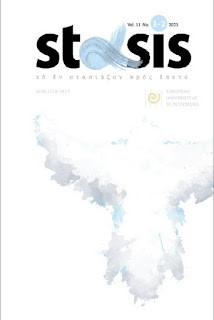Tom Walker or Sandwichman (many of us know him as) has a series of articles I am going to post to Angry Bear. Tom spends much of his time discussing Labor and its value to capital or what I would call manufacturing. Without Labor input there would be no value. Leisure to Attend to Our Spiritual Business (updated to include link to published article) by Tom Walker (Sandwichman) ABSTRACT (PDF AVAILABLE HERE) Time is central to Martin Hägglund’s discussion of secular faith and spiritual freedom. Time is precisely what is finite in this life and presides over the relationships we value and our risk of losing them. Hägglund adopted the notion of disposable time from Karl Marx’s Grundrisse and reframed it as the more
Topics:
Sandwichman considers the following as important: history, leisure, US/Global Economics
This could be interesting, too:
Ken Melvin writes A Developed Taste
Joel Eissenberg writes How Tesla makes money
Angry Bear writes True pricing: effects on competition
Angry Bear writes The paradox of economic competition
Tom Walker or Sandwichman (many of us know him as) has a series of articles I am going to post to Angry Bear. Tom spends much of his time discussing Labor and its value to capital or what I would call manufacturing. Without Labor input there would be no value.
Leisure to Attend to Our Spiritual Business (updated to include link to published article)
by Tom Walker (Sandwichman)
ABSTRACT (PDF AVAILABLE HERE)
Time is central to Martin Hägglund’s discussion of secular faith and spiritual freedom. Time is precisely what is finite in this life and presides over the relationships we value and our risk of losing them. Hägglund adopted the notion of disposable time from Karl Marx’s Grundrisse and reframed it as the more descriptive socially available free time. Following Marx, Hägglund advocates the revaluation of values so that socially available free time would become the measure of value rather than socially necessary labour time.
A close examination of the origin of Marx’s analysis of disposable time suggests that questions of faith and freedom were inherent in the concept as it was expressed in the 1821 pamphlet, The Source and Remedy of the National Difficulties that influenced Marx, in the writings of William Godwin that inspired the 1821 pamphlet, and ultimately in theological views on the doctrine of the calling that Godwin secularized in his pioneering advocacy of leisure as a universal human right.
Marx’s innovation was to show that the creation of disposable time is the basis of all wealth. Under capitalism, disposable time is expropriated in the form of surplus labour time, thereby inverting the relationship between necessary and superfluous labour time — the superfluous becomes necessary (for capital) and the necessary superfluous. Marx’s analysis of the inversion of necessary and superfluous labour time bears close resemblance to Ludwig Feuerbach’s critique in The Essence of Christianity, which had influenced the early Marx, of the inversion of collective humanity and the divine.

